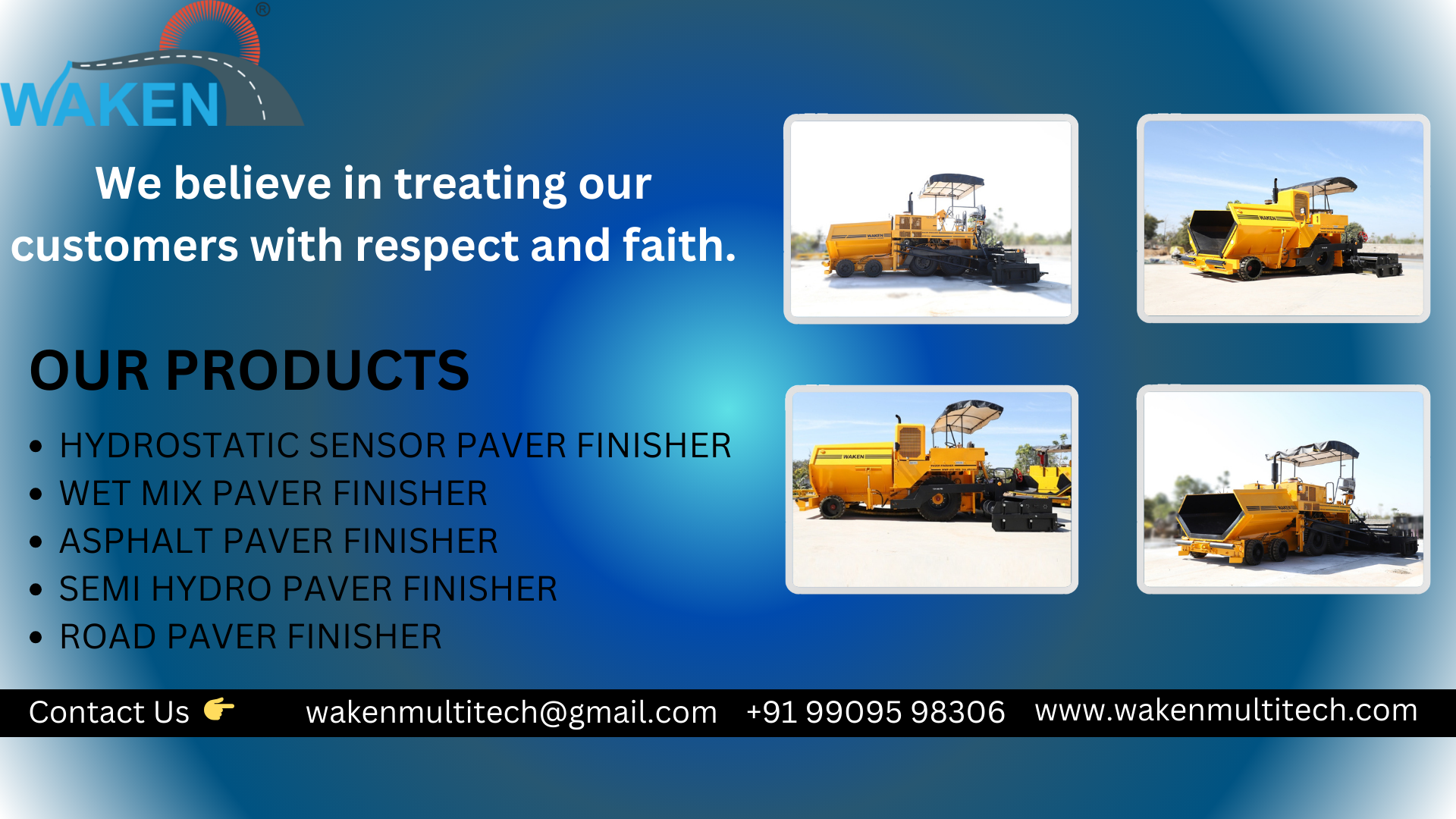Introduction to Conventional Mechanical Paver Machine
Conventional Mechanical Paver Machines spread base, binder, and asphalt layers using reliable mechanical drives and intuitive controls. Ideal for India’s highways and municipal works, they balance ownership cost with dependable output. Operators appreciate rugged design, easy servicing, and flexible width adjustments for varied corridors. Steady conveyors and augers maintain a consistent head of material, helping achieve smoother profiles and fewer corrective passes. For compatible plants, rollers, and commissioning support tailored to Indian conditions, visit our Waken Multitech resources and align your fleet, crew training, and quality objectives confidently.
Working Principle and Process Flow of Conventional Mechanical Paver Machine
Material is discharged into the hopper, then mechanical conveyors feed it toward the augers. Augers spread mix uniformly ahead of the screed, which levels and pre-compacts to target thickness. Operators set width, crown, and slope using clear controls, while heaters stabilize screed temperature for consistent texture. Continuous truck exchanges sustain flow and minimize segregation. Final rollers achieve density and smoothness as per drawings. Explore setup checklists, calibration notes, and logistics planning on the official website to streamline paving sequences and documentation requirements.
Types of Conventional Mechanical Paver Machine
- Wheeled mechanical paver for municipal streets and patchwork, enabling rapid relocation, tight turns, and efficient short-distance material placement.
- Tracked mechanical paver for highways and industrial corridors, delivering superior traction, flotation, stability, and uniform mats on variable subgrades.
- Hydraulic extendable screed variant supporting flexible paving widths, smoother joints, and faster setups across lanes, shoulders, medians, and service roads.
- Compact mechanical paver suited to town roads and campuses, emphasizing maneuverability, lower transport cost, and simple controls for smaller crews.
- High-capacity base-course paver optimized for wet mix macadam and granular layers, maintaining throughput and consistent thickness on long, continuous pulls.
Key Features and Specifications of Conventional Mechanical Paver Machine
- Hydraulic screed extensions cover common Indian lane widths with reliable leveling and profile control.
- Mechanical conveyors and augers deliver steady material flow, minimizing segregation and improving mat uniformity.
- Rugged chassis, wear-resistant plates, and guards enhance durability for dusty, high-temperature job sites.
- Intuitive operator station enables quick thickness, crown, and slope adjustments with clear visibility and ergonomics.
- Accessible service points and nationwide spares support reduce downtime and simplify preventive maintenance planning.
Applications of Conventional Mechanical Paver Machine
- National and state highways where uniform base and binder layers are vital; mechanical pavers provide consistent thickness, smooth profiles, and dependable output that withstands monsoon cycles, heavy axle loads, and rigorous IRC quality assurance requirements.
- Urban streets, BRT corridors, and junction improvements demanding precise widths, quick mobilization, and minimal disruption; stable feed systems and accurate screed control reduce rework, accelerate handovers, and improve ride comfort for commuters and logistics fleets.
- Industrial parks and SEZ internal roads requiring durable bases and reliable drainage; maintained thickness and texture support forklift traffic, frequent turning movements, and compliance with safety, audit, and maintenance standards across shift-based operations.
- Rural connectivity and PMGSY works where affordability, uptime, and straightforward operation matter; mechanical pavers help standardize profiles, reduce manual spreading, and deliver predictable progress despite variable aggregates, haul distances, and staffing levels.
Benefits of Using Conventional Mechanical Paver Machine
- Lower lifecycle cost through reduced rework, efficient fuel usage, and longer pavement life; uniform distribution and controlled screed settings deliver consistent bases, improving contractor margins and milestone predictability across diverse Indian climates and subgrade conditions.
- Quality consistency from stable material feed and accurate leveling; smoother profiles and fewer thickness deviations minimize corrective passes, enhance ride indices, and help meet IRC tolerances, concessionaire KPIs, and funding agency audit documentation requirements.
- Time savings through quick width adjustments, reliable conveyors, and fast setups; coordinated plant-to-paver logistics reduce waiting, enabling higher daily outputs, better crew utilization, and dependable schedules for municipal, highway, and industrial estate packages.
- Scalable performance from patch repairs to long corridors; ergonomic controls, visibility, and simple training improve safety, while documentation trails and checklists support compliance, warranty claims, and transparent handovers across multi-package infrastructure programs.
Top Manufacturers and Suppliers in India
India’s market for conventional mechanical pavers includes established domestic OEMs and international brands operating through regional dealerships. Buyers typically compare screed technology, width ranges, conveyor design, engine compliance, and after-sales commitments. Standard configurations feature hydraulic extendable screeds, robust auger–conveyor systems, ergonomic platforms, and dependable powertrains sized for highways and municipal jobs. Vendors commonly offer commissioning assistance, operator training, preventive maintenance schedules, and fast-moving spares to minimize downtime. Evaluation often weighs lifecycle cost, fuel efficiency, warranty terms, and compatibility with local asphalt or wet mix plants, rollers, and data logging practices. Shortlists favor suppliers with proven deployment on corridors, city arteries, and industrial estates under Indian climatic and aggregate conditions.
Maintenance and Safety Tips
- Inspect hopper, conveyors, augers, and screed daily; check fasteners, leaks, and guard integrity.
- Remove material build-up; lubricate chains, bearings, and pivots strictly per OEM intervals.
- Verify thickness, crown, and slope adjustments; recalibrate after maintenance or transport between sites.
- Train operators on signaling, PPE, exclusion zones, and emergency stops before production runs.
- Stock essential spares and store electronics, hoses, and controls under cover during monsoons.
FAQs – Conventional Mechanical Paver Machine
Contact Details
Talk to our specialists today for tailored solutions and fast assistance.
